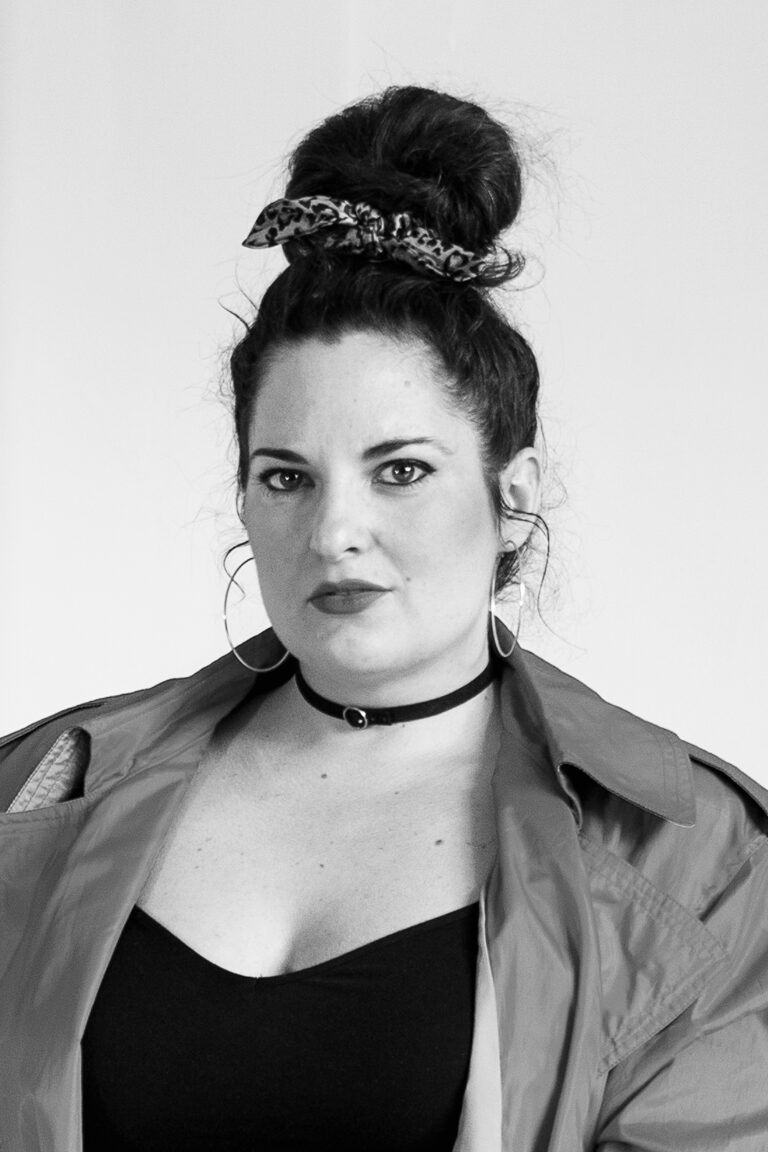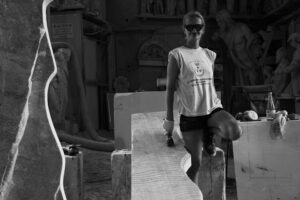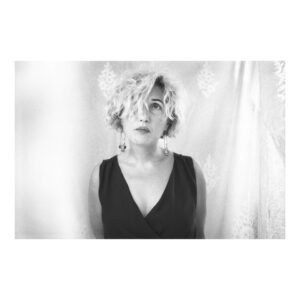Éva Szombat

– born in 1987, Kaposvár – lives and works in Budapest. Inspired by camp aesthetics and combining the worlds of kitsch and glamour, her photos focus on possible paths to happiness, unconventional modes of beauty or tabooed female sexuality. Her works were featured in magazines such as Vice, Vogue Spain or the Huffington Post. She was also the recipient of scholarships allowing her to work in Paris and New York. In addition to her artistic and applied practice, she has been teaching photography at the Moholy-Nagy University of Art and Design, Budapest. The series I Want Orgasms, Not Roses won the Robert Capa Grand Prize in 2021, later published by Kehrer Verlag in collaboration with Everybody Needs Art in 2022. In 2023 the book was a joint winner at Belfast Photo Festival Photo-Book Award. She is currently attending doctoral school and teaching photography at MOME. She is represented by Longtermhandstand.
In photography, I look for the funny, absurd side of life, the moments when we are able to overcome tragedies and face them to find joy. I try to find answers on how to feel good despite hardships in life.
It was in this spirit that the Happiness1 project was born in 2014. Part of the project is a handbook to happiness. I researched the subject further in a series called Practitioners2, in which I photographed people3 who I think enjoy their daily lives4 and who can inspire others to live a happier life5.
Later, I became interested in my relationship to my own body and the expectations towards female body in general, which I reflected on in my series Beyond the Curve6. In 2017, I turned thirty and got married. I never was a standard size, but at the time I noticed that I was also gaining a few pounds compared to myself; I decided to go on a diet and exercise. Usually, the success of these attempts was only temporary. The memories of my bad experiences resurfaced: when my ex-partner forced me to the scales, or when I was compared to my thin girlfriends. My husband’s acceptance and support also helped me to succeed and feel good in my skin7. I didn’t go through a magical weight loss, but I finally managed to accept my body and realized that I didn’t have to compare myself to others, I needed to be my own standard.
Although museums are full of nudes depicting naked women, these were mostly made by men. Female sexuality is also still a taboo, a sinful thing. This is what inspired my latest project8 to interview women and photograph them with their sex toys9. While we were working together, my models opened up to me about themselves and told me the most intimate details. These stories are often about traumas that subjects were able to overcome and to experience a form of sexuality that satisfies them10.
In addition to my art artistic practice, I also have applied photographic commissions; in these situations I experienced that as a woman I have to accomplish more for my clients to believe that I can realize the project. It also happened in my previous relationships that my partner couldn’t handle my successes, and that affected me for a long time. In my thesis, I processed this experience and my relationship with men; I then presented it to a diploma committee in which there was no woman.
At the time, I still knew little about feminism. I remember when I first came across the provocative questions of Guerrilla Girls, Judy Chicago’s Dinner Party, Robert Mapplethorpe’s famous photo of Louise Bourgeois, and then Bourgeois’ work, Tracey Emin’s Everyone I Have Ever Slept With or Peaches ’music: all this lit up something in me, when I was in my twenties. At the time I graduated, however, it was not yet clear how one could talk about the absence of female teachers and the fact that, most of the time, my works are evaluated by men. I also raised this issue in my dissertation, not knowing that in a few years they would ask to teach me as well.
As I see the limits of our world more and more clearly, feminism is playing an increasingly important role in my life and work. I think that the situation of women, the legal control forced over women’s bodies are also increasingly burning questions. We don’t even have to go far to see this, because in Poland, people are protesting against the ban on abortion, while Hungary is legislating about what a family is, restricting adoption and making the lives of queer people bitter. Our politicians say to women that earning less than men is absolutely fine. After all, we women are strong, and our bearing capacity is one of our greatest virtues.
Social critique is a characteristic element of my work. I embed it in my own visual world at times prone to kitsch. The political dimension of my artistic practice is most present in my studies of the female body. When renowned men in Hungary make a statement about what an ideal woman should be, I feel like we are going back in time. With my work, I would like to draw attention to the damage that these expectations can cause and to show that it is worth going against the norms and taking on ourselves.
The statement was written in collaboration with curator Andrea Soós (2020).
1Image: Éva Szombat, Zsófi from the Happiness Book, 2013, self-published, Budapest. Courtesy of the artist.2Image: Éva Szombat, from the series Practitioners, 2016, digital photo. Courtesy of the artist.
3Image: Éva Szombat, from the series Practitioners, 2016, digital photo. Courtesy of the artist.
4Image: Éva Szombat, from the series Practitioners, 2016, digital photo. Courtesy of the artist.
5Image: Éva Szombat, from the series Practitioners, 2016, digital photo. Courtesy of the artist.
6Image: Éva Szombat, from the series Beyond The Curve, 2017, digital photo. Courtesy of the artist.
7Image: Éva Szombat, from the series Beyond The Curve, 2017, digital photo. Courtesy of the artist.
8Image: Éva Szombat, from the series I Want Orgasms, Not Roses, 2017-2021, digital photo. Courtesy of the artist.
9Image: Éva Szombat, from the series I Want Orgasms, Not Roses, 2017-2021, digital photo. Courtesy of the artist.
10Image: Éva Szombat, from the series I Want Orgasms, Not Roses, 2017-2021, digital photo. Courtesy of the artist.
– szül. 1987, Kaposvár – fotográfus Budapesten él és dolgozik. A camp esztétika által inspirált, a giccs és a glamúr világát ötvöző fotói olyan témákat mutatnak be, mint a boldogság lehetséges útjai, a szépség nem konvencionális módjai vagy a tabuként kezelt női szexualitás. Munkái olyan magazinokban jelentek meg mint a Vice, a Vogue Spain vagy a Huffington Post. Ösztöndíjjal Párizsban és New Yorkban is alkotott, jelenleg művészeti és alkalmazott munkái mellett a Moholy-Nagy Művészeti Egyetem fotográfia szakán oktat. A “Szeretnék orgazmusokat, nem rózsákat” sorozat 2021-ben elnyerte a Robert Capa Nagydíjat, amelyet később Kehrer Verlag tett közzé, 2022-ben az Everybody Needs Art együttműködésével. 2023-ban a könyv közös nyertese volt a Belfast Photo Festival Photo-Book Award-nak. Jelenleg doktori iskolába jár és fényképezést tanít a MOME-ban. Longtermhandstand képviseli.
A fotográfiában az élet vicces, abszurd oldalát keresem, azokat a pillanatokat, amikor képesek vagyunk felülkerekedni a tragédiákon és szembemenve azokkal megtalálni az örömöt. Arra próbálok válaszokat találni, hogy hogyan lehet jól lenni a nehézségek ellenére.
Ebben a szellemben született 2014-es Boldogság1 című projektem is. A projekt egyik része egy könyv, amely egy útmutató a boldogsághoz. A témát Practitioners2 című sorozatban kutattam tovább, amelyben olyan embereket fotóztam3, akikről úgy gondolom, hogy a mindennapi életüket örömmel élik4, és akik másokat is inspirálhatnak egy boldogabb életre5.
Később a saját testemhez fűződő viszonyom és a női testtel szemben állított elvárások kezdtek el érdekelni, amelyre a Beyond the Curve6 című sorozatomban reflektáltam. 2017-ben harminc éves lettem és férjhez mentem. Sosem voltam konfekció méret, de akkoriban feltűnt, hogy magamhoz képest is felszedtem pár kilót, ezért elhatároztam, hogy diétázni és mozogni fogok. Ezek a próbálkozások általában csak ideig-óráig voltak sikeresek. Élénken éltek bennem a múltbéli rossz élményeim: amikor a volt partnerem a mérlegre kényszerített, vagy amikor a vékony barátnőimhez hasonlítgattak. A férjem elfogadása és támogatása is segített abban, hogy sikerrel járjak és jól érezzem magam a bőrömben7. Nem varázslatos fogyás történt, hanem végre sikerült elfogadnom a testem és rájöttem, hogy nem másokhoz kell viszonyítani magam, hanem saját magamhoz.
Bár a múzeumok tele vannak meztelen nőket ábrázoló aktokkal, ezeket többnyire férfiak csinálták és a női szexualitás ma is tabunak, bűnös dolognak számít. Ez a gondolat inspirálta a legújabb projektemet8, amelyben nőkkel készítek interjúkat és fotózom őket a szexuális segédeszközeikkel9. A közös munka során a modelljeim megnyílnak nekem, mesélnek magukról, a legintimebb részletekről. Ezek a történetek sokszor traumákról szólnak, amelyeken az alanyok túl tudtak lépni, és eljutottak a számukra kielégítő szexualitás megéléséhez10.
A művészet mellett alkalmazott fotográfiai munkáim is vannak, és ezekben a helyzetekben tapasztaltam, hogy nőként többet kell teljesítenem azért, hogy a megbízóim elhiggyék, meg tudom csinálni a projektet. Régebben párkapcsolatban is megesett, hogy a partnerem nem tudta kezelni a sikereimet, és ez sokáig hatással volt rám. A diplomamunkámban ezt az élményt, illetve a férfiakkal való kapcsolatomat dolgoztam fel, amit aztán egy olyan diplomabizottság előtt prezentáltam, amelyben egy nő sem volt.
Akkoriban még keveset tudtam a feminizmusról. Emlékszem amikor először találkoztam a Guerrilla Girls provokatív kérdéseivel, Judy Chicago Vacsorapartijával, Robert Mapplethorpe híres fotójával Louise Bourgeois-ról, majd az ő munkásságával, Tracey Emin Everyone I Have Ever Slept With című munkájával vagy Peaches zenéjével: ezek mind-mind elindítottak bennem valamit a huszas éveimben. A diploma idején azonban még nem volt egyértelmű, hogyan lehetne beszélni arról, hogy nincsenek női tanárok és a legtöbbször férfiak értékelik a munkámat. A szakdolgozatomban fel is vetettem ezt a problémát, nem sejtve, hogy pár év múlva fel fognak keresni, hogy én is oktassak.
Ahogy egyre jobban látom a világunk korlátait, úgy egyre fontosabb szerepet játszik az életemben és a munkámban is a feminizmus. Azt gondolom, hogy egyre égetőbb kérdés az is, hogy milyen a nők helyzete, hogy a törvények hogyan rendelkeznek a nők teste fölött. Nem is kell messzire menni, hogy ezt lássuk, hiszen Lengyelországban éppen az abortusz betiltása ellen tüntetnek, itthon törvénybe foglalják mi a család, korlátozzák az örökbefogadást, megkeserítik a queer emberek életét. Politikusaink azt sugallják a nőknek, hogy az, hogy kevesebbet keresnek mint a férfiak, az teljesen rendben van. Hiszen mi nők erősek vagyunk, és a teherbírásunk az egyik legnagyobb erényünk.
A társadalomkritika jellemző eleme a munkáimnak, amit aztán a saját, olykor giccsbe hajló vizuális világomba ágyazok be. A politikai dimenzió a művészeti gyakorlatomban leginkább a női testtel kapcsolatos vizsgálódásaimban van jelen. Amikor Magyarországon ismert férfiak nyilatkoznak arról, hogy milyennek kell lennie az ideális nőnek, akkor az az érzésem, mintha visszafelé haladnánk az időben. A munkámmal szeretném felhívni a figyelmet arra, hogy milyen károkat tudnak okozni ezek az elvárások, és bemutatni, hogy megéri szembemenni a normákkal és felvállalni önmagunkat.
Az artist statement Szombat Éva és Soós Andrea együttműködésében jött létre (2020).
1Kép: Szombat Éva, Zsófi a Boldogság Könyvből, 2013, saját kiadás, Budapest. A művész jóvoltából.2Kép: Szombat Éva, a Practitioners sorozatból, 2016, digitális fotó. A művész jóvoltából.
3Kép: Szombat Éva, a Practitioners sorozatból, 2016, digitális fotó. A művész jóvoltából.
4Kép: Szombat Éva, a Practitioners sorozatból, 2016, digitális fotó. A művész jóvoltából.
5Kép: Szombat Éva, a Practitioners sorozatból, 2016, digitális fotó. A művész jóvoltából.
6Kép: Szombat Éva, a Beyond The Curve sorozatból, 2017, digitális fotó. A művész jóvoltából.
7Kép: Szombat Éva, a Beyond The Curve sorozatból, 2017, digitális fotó. A művész jóvoltából.
8Kép: Szombat Éva, az I Want Orgasms, Not Roses sorozatból, 2017-2021, digitális fotó. A művész jóvoltából.
9Kép: Szombat Éva, az I Want Orgasms, Not Roses sorozatból, 2017-2021, digitális fotó. A művész jóvoltából.
10Kép: Szombat Éva, az I Want Orgasms, Not Roses sorozatból, 2017-2021, digitális fotó. A művész jóvoltából.



